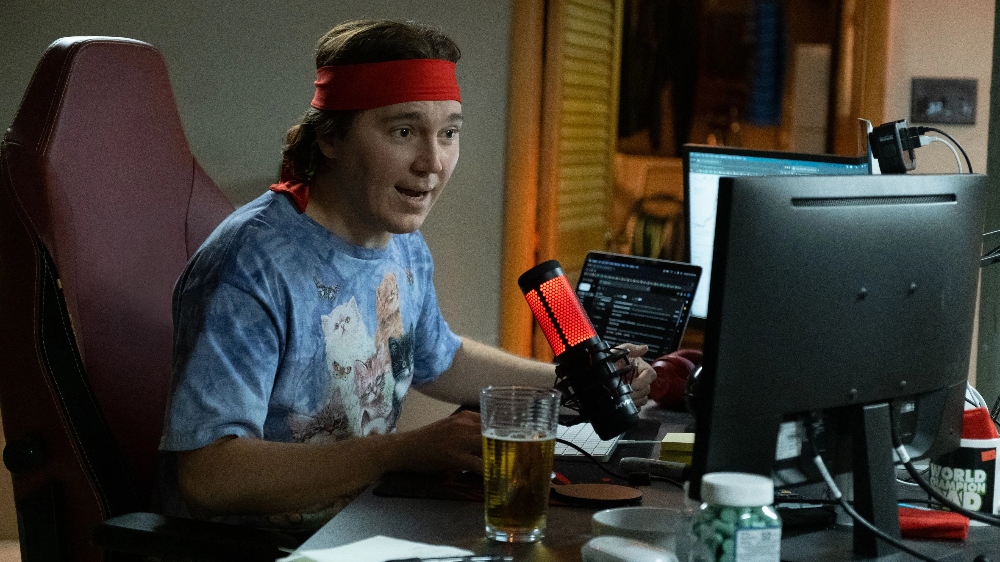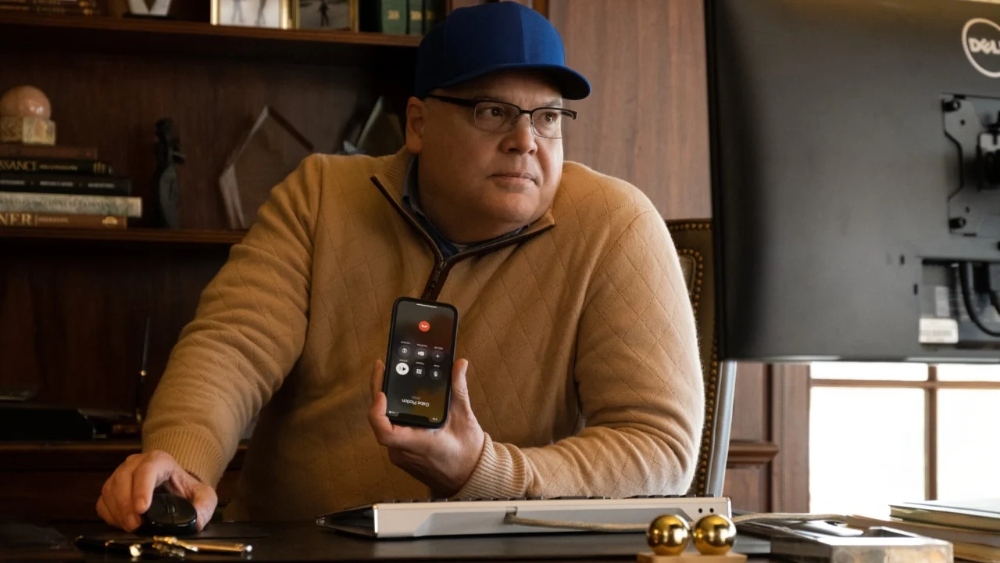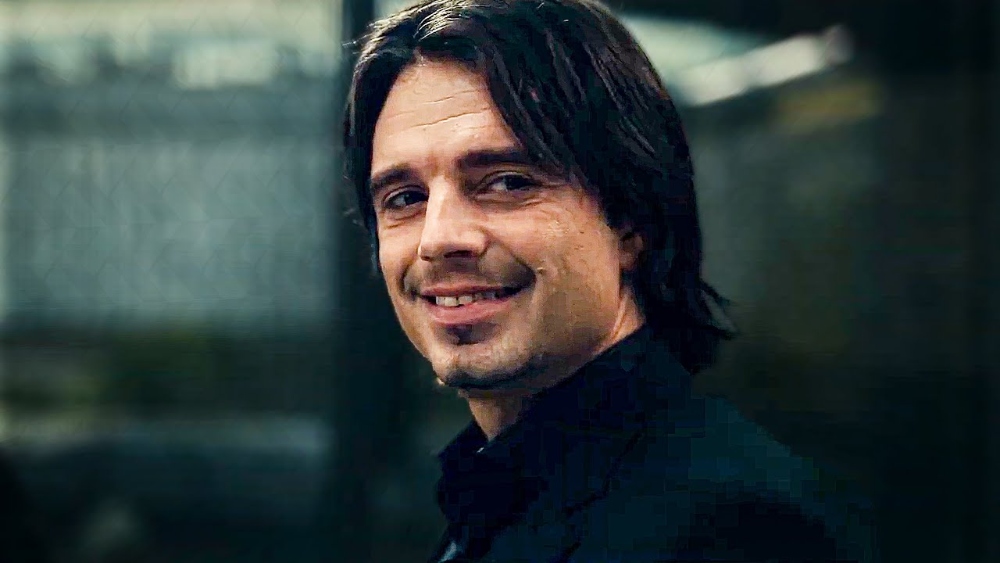As soon as the GameStop saga began, so did the race to dramatize it in Hollywood. Numerous projects were “fast-tracked” in development, but in the end, only one could win the race to the big screen, and to the victor goes the spoils.
That victor is Dumb Money, a new Sony comedy from director Craig Gillespie (I, Tonya) that bills itself as the “ultimate David and Goliath tale,” pitting lowly retail investors against billionaire Wall Street whales. The film has been playing in select theaters for the past two weeks, though it enters wide release on Friday boasting largely positive reviews.
The film stars Paul Dano as Keith Gill, aka Roaring Kitty, the YouTube creator who started and later took advantage of the GameStop short squeeze that was largely driven by the subreddit r/WallStreetBets. Shailene Woodley plays Gill’s wife, while Pete Davidson plays his brother, and the rest of the cast includes Seth Rogen, Nick Offerman, and Vincent D’Onofrio as a trio of powerful billionaires, as well as America Ferrera, Anthony Ramos, and Myha’la Herrold as three retail traders, aka, the film’s titular “dumb money.”
Dumb Money hails from screenwriters Lauren Schuker Blum and Rebecca Angelo, a pair of former Wall Street Journal reporters who adapted Ben Mezrich‘s book The Antisocial Network. Schuker Blum and Angelo have been writing together since their time on the Netflix series Orange Is the New Black, and they were eager to share the story of how they fell down the GameStop rabbit hole and hustled to get this star-studded movie made.
Above the Line recently spoke to the scribes, who discussed everything from casting and music cues to working with Gillespie and beefing up Davidson’s role before offering a few updates on their upcoming projects.

Above the Line: Tell me how the two of you first met and how you decided to write together.
Rebecca Angelo: Oh, I love that question.
Lauren Schuker Blum: No one’s ever asked us that.
Angelo: We met at the Wall Street Journal newsroom in a previous life and decided to try our hand at screenwriting starting about 11 years ago, and we’ve been doing it ever since.
Schuker Blum: We wrote a couple of TV specs that we sold, we were on Orange Is the New Black, and then we started writing features, mostly for Amy Pascal.
Angelo: We have reporters’ souls — and bodies — but we had Wall Street Journal real estate, and the Journal is an incredible newspaper [but] we found ourselves telling stories that ended up, more often than not, beginning at 1500 words and running at 250, and it just felt like we could tell better, deeper stories in this medium.
Schuker Blum: Yes, you have more time to tell them. We still write many, many true stories in terms of the movies we take on. And then, of course, when Hollywood started going crazy for this story, [we were like], ‘this is something we want to do.’ We had written a different film about internet populism, and we were deeply interested in that topic because it’s one of the most dominant forces shaping our society right now but also the least cinematic, so…
Angelo: It feels like we’ve been in a practice since 2016, at an absolute minimum, of trying to understand these movements and try to find ways of rendering them for the screen that are visceral, visual, and [that] capture the passion and energy behind these movements when really, what you’re seeing in real life, is basically this [indicating typing].
Schuker Blum: Which is why, like, every big, contemporary film director is doing a period piece right now.
Angelo: Yeah, there was some statistic about the last time all the eminence grise of Hollywood made a contemporary film, and it’s like, 20 years ago, 30 years ago that [Martin] Scorsese and [Steven] Spielberg were doing this. So we obviously studied [Frank] Capra very closely, in addition to…
Schuker Blum: The Social Network.
Angelo: Yeah, it’s being compared to The Big Short and that kind of thing, which we also studied and really admired, but we looked at the populist cinematic tradition for inspiration to how you dramatize regular, everyday lives in a way that feels big, and the way it feels as we live them. And the same thing [goes for] these movements. It may not look like much when you’re sitting at a computer, but what it feels [like] is what we were after.
Schuker Blum: And that was probably what led to our choice to even include those real TikToks you see in the film. Those were in the script to say that regular people deserve the big screen treatment, which really is, like, the Capra-esque inspiration to this.

ATL: Did you feel pressure to race to finish the Dumb Money given how many other GameStop projects were in the works at the time?
Angelo: Oh yes, to put it mildly. That was our explicit mandate. They just said, ‘Here is the job. Run.’ So we did our best to run.
Schuker Blum: Yeah, inspired by Keith Gill, and it’s ironic that we have all the running in the movie.
Angelo: I wonder if it’s not ironic, I wonder if it somehow happening in our brains that we were being told to hurry the fuck up. So we were like, ‘You too, Roaring Kitty!’
Schuker Blum: We’d written a film that Seth Rogen was directing about a different internet populist movement, it was about politics, and we had written two films for Craig Gillespie and we were actually in Craig’s house, breaking a different movie and writing for him when he got a copy of this script and we decided to work on it together, so, in a way, we had a shorthand with him that really helped get this out there as fast as possible.
We’d kind of been training to write this and knew the structure. And there were all these challenges baked into this project. Like, we have characters who have never met, who are never going to meet, and [who] are never in the same room, so the ins and outs of every scene are written in a very…
Angelo: We wrote the original sequence cutting back and forth to “WAP” [by Cardi B]. That’s in the original version of the script because we felt like it needed to—
Schuker Blum: There were music cues in our script. Every review was like Craig chose this song, but that was in the script.
Angelo: Yeah, no he didn’t [smiling while giving two middle fingers]! He chose some of them… but the idea of that opening sequence was to build to a kind of old-fashioned, western-style faceoff between rivals, and of course, our rivals never met and never were in the same room, but we wanted to have a moment when they make eye contact and squared off as in a duel, and that moment comes in the silliest way, of course, with Gabe Plotkin watching a video of Keith Gill pretending to catch a cat, and he freezes it just at the moment where their eyes meet—
Schuker Blum: And he says, like, “Who is this schmuck?” And also, we both know in that moment, staring into a computer screen and having a very emotional reaction looking at someone, you realize that at some point, Gabe Plotkin looked up Roaring Kitty and had this moment of eye contact, and that’s what you want to render — that very grounded but emotional moment in the movie.
ATL: How long did it take you to finish your first draft?
Angelo: Six weeks.
Schuker Blum: But we did many, many, many drafts… and as former journalists, you know, you rewrite yourself.
Angelo: It’s a profoundly iterative process when you’re doing it right. And the amazing thing about Craig is that some directors come on to a project and they never want to see the writer again, and we are still in constant contact with Craig and we love him and we work so well together. We were pulling all-nighters rewriting for him. He came onto the project and we were in production in four weeks, or six weeks.
Schuker Blum: Yeah, because it felt like the story was [still] unfolding. The SEC didn’t finish their investigation until, I think, three months after we had finished our third draft, so we did another one, and that was sort of fun — writing while this was all unfolding.

ATL: What was the most surprising thing you learned while researching this story?
Angelo: I think the wildest details in the film are the truest, although, like, we have a 26-page annotation document that we’d love to walk you through that has a host of horrifying and surprising details.
Schuker Blum: We had obviously covered finance to some degree at the Wall Street Journal, and I always thought I kind of understood the stock market, but I was surprised that there are still so many mechanisms that no one understands that are very opaque. Like, the DTCC, [which is] one of the wonkiest parts of the movie. We thought that was a government body that regulates stocks.
Angelo: You hear an acronym, it’s the DTCC. What’s the DTCC? Oh, it’s a subsidiary of the NSCC. It’s like, ‘Oh, okay.’
Schuker Blum: Which is an industry trade group, so Wall Street is actually self-regulating, they don’t have government oversight into this part of it and who’s clearing trades. There’s still so much opacity on Wall Street, and of course, the irony hits us, we’re here talking to you as the producers of the film, but we’re also the writers, and there’s so much opacity on Wall Street, and in Hollywood, so we’re very proud to be part of the WGA fighting for transparency.
Angelo: Yeah, the mystery around that 3 a.m. phone call… we used to think we just had a lay understanding of this stuff and we just didn’t get it and I think [to] a lot of people, it seems really complicated and you think, ‘Oh, I’m just unsophisticated.’ But as we dug deeper and really did the work of understanding this stuff, it’s deliberately opaque, it’s meant to be exclusionary, and yeah, the system is rigged.
Schuker Blum: And no one understands it. Like, still no one understands what happened on that 3 a.m. phone call.
ATL: Did either of you buy any GameStop stock and what are your general thoughts on the stock market? Is it as rigged as this movie suggests?
Schuker Blum: No, we did not buy any.
Angelo: We’re much more conservative.
Schuker Blum: We did a crypto TV show, and had we bought crypto when we were doing [that], we would be much richer.
Angelo: I think you can see how much we admire Keith through the movie, first and foremost for his conviction. He’s a person of real passion and conviction, and deep morals, at a time when it seems like everyone is clamoring for attention and fame, he is profoundly private and very modest. He made $47 million and he didn’t sell. That is not Lauren and my relationship with money. We’re partly in awe of his ability to—
Schuker Blum: It’s not most retail traders. They mostly underperform the market, and Keith Gill is an anomaly, and we make that clear in the movie. But also, I think he’s a great advertisement for the value of investing and holding on to a stock, which is what Warren Buffet has said to do.
Angelo: And that really inspired us from the very beginning. His name is DeepFuckingValue, he’s a value investor, and he sees value where others, especially hedge fund managers, see something that should be burned to the ground. That feels like a very plastic idea and a very important idea that is applicable in our industry, in many industries, about the dignity and value of companies, of labor, and of people’s work.
Schuker Blum: And I think to really answer your question, the system definitely is rigged, and if you look at Robinhood, which was promising “free trading,” trading is not actually free, as AOC points out in the film. There are all these hidden costs. You are a user, and you are being used by the company. But that could be solved by more transparency and perhaps regulation.

ATL: What did Craig bring to the table and elevate the script that the two of you wrote?
Angelo: We love Craig so much, and there’s nobody’s better with energy. He just has a feeling for his work. He’s incredible with actors.
Schuker Blum: He would stand on set and do something, and we’d be like, ‘Why are you doing that?’ and he’d be like, ‘It’s for the energy.’ When we wrote the script, we knew [that] for the movie to work, we wanted it to move like a bat out of hell, to quote the great Billy Friedkin, and that’s Craig’s superpower. He just makes things move, and he’s really a master of that propulsive, frenetic pace.
Angelo: And he’s wonderful with small moments. And we were there for every day of the shoot, and he never cuts, he just keeps the camera rolling. We only had 31 days to shoot and he captured every second of those 31 shoot days.
Schuker Blum: After two days of shooting, you have, like, storage for the film, and the person running that was like, ‘So we ran out of storage…’
Angelo: He used up the entire storage—
Schuker Blum: Because he doesn’t cut.
Angelo: And it creates this incredible environment on set where actors feel really safe. And we would watch him elicit one performance in one take and then come at it from a totally different angle in another take and it just brought a depth to the performances that was absolutely [incredible].
Schuker Blum: And also, every actor in this is basically acting alone. Paul Dano is sitting in a basement alone with no actor to play off of, and Craig is an actor’s director, so he was able to pull out the energy in those moments.
Angelo: Craig was also obsessed with masks, which became this really potent, shorthand imagery in the movie for the haves and the have-nots.
Schuker Blum: Yeah, it was a great choice.
Angelo: We were like, ‘Are we sure we want to have Dane DeHaan, a brilliant actor, hidden in a mask for 90 percent of his role?’ and Craig was like ‘Yes, I am.’ And we think that was the right choice.
Schuker Blum: I think we also consistently thought about making this a relatable movie for an audience. You could get lost in very wonky financial concepts because there was so much to this story, but he was our North Star in making this a great ride and not getting so caught up in details.

ATL: Let’s talk about the casting. Did you guys have any say in the process? You have to be happy with how it all worked out. Do you have a favorite performance within the ensemble that you want to single out for some extra love here?
Angelo: Oh my gosh, we love them all. They’re all incredible. We tend to find ourselves talking most about America Ferrera and Shailene Woodley’s performances just because they brought so much humanity to those roles, but, like, Sebastian Stan is a fucking genius with what he does with Vlad [Tenev].
Schuker Blum: My God, he’s incredible. And Pete Davidson, when Craig cast him, we made that role bigger, and I think we were always surprised by the humanity he brings and the touching moments. He’s obviously incredibly funny but there’s a lot of heart to those brother scenes.
Angelo: Seth is playing against type in this part, and it was super important to us that this wasn’t of heroes and villains. We did a ton of research and interviews about the retail traders, and we also did a ton of research and interviews about the Wall Street folks that we depict onscreen. Gabe Plotkin is, by all accounts, a lovely human being [and] a good family man. I feel like social media sends us to extreme, two-dimensional caricatures of people all the time. Wherever you stand, you imagine your opponent to be a simplified, reduced, flattened version of themselves, and we tried to depict that on both sides. So, what the hedge fund guys think of the retail traders, the dumb money, but also what the retail traders think of the hedge funds.
So there’s that sequence in the middle where they’re reading this online screed that kind of caught fire in the middle of this where they’re imagining the hedge fund guys with their hookers and their blow on their yachts, and we contrast that with the reality, which is, Gabe is a family man having a Shabbat dinner with his family, tucking his son in [to bed] and reading him a book and doing the dishes. It was important that Seth capture that because we did not want Gabe to be a mustache-twirling villain, and it’s impossible not to love Seth. He brought a [sense of] humanity to the role that is essential because it could’ve easily flattened out with somebody else
ATL: Did you guys have any characters or storylines that were cut for time, or emphasized in the film?
Schuker Blum: We had another character that was in Ben’s book — a college student who was in a version of the script, but we never shot it or cast him.
Angelo: It was a father-son story where the father had struggled a lot, and so we took some of the aspects of the father’s struggle and gave it to Harmony’s character [Talia Ryder], the college girl. She has a little monologue about the struggles that her father faced health-wise and professionally, and that’s what inspired that.
Schuker Blum: The ensemble really stayed the same, I think, mostly through the first draft. It was clear we wanted to do this as an ensemble because it’s a movement, right? So we didn’t want to focus just on Keith Gill or on one person, and it kind of stayed consistent.

ATL: I wanted to get some quick status updates from you guys. What’s the status of Wolfman? Any updates on that one?
Angelo: Oh, that’s a really good question.
Schuker Blum: Great question!
Angelo: We don’t know!
Schuker Blum: That’s a question for Jason Blum [who is Lauren’s husband]. But it’s a good question to ask him now.
ATL: What about the Sue Mengers movie? Is there a new director on that project?
Schuker Blum: We love that movie.
Angelo: We love it so much and Jen is so brilliant, but there’s not an update to share right now.
Schuker Blum: We’re looking for a director.
ATL: What about the Scarlett Johansson movie Bride that’s in the works at Apple and A24?
Angelo: I wouldn’t wait to see that anytime soon.
ATL: I know you two worked on a Chippendales movie and I’m curious, do you feel like it may be dead because of Kumail Nanjiani’s Hulu series?
Angelo: Yeah, both of the projects came out of different parts of Disney, and Hulu had made a $100 million commitment to Kumail’s series upfront, so… we were ready to go, but because they had put so much money into this other thing, it couldn’t happen.

ATL: Let’s check in on the strike. After four months, what are your thoughts on it, how does it get resolved, and are there any issues you feel the WGA could concede on given that it’s rare in a negotiation for one side to get everything it’s asking for?
Angelo: Yeah, I mean, I think we really trust in the leadership of the union and believe in the vital importance of this standoff right now, and of this campaign and this mission.
Schuker Blum: Yeah, and I think it does feel like an existential moment, as you said, where it really is a make-or-break time to make writing a profession, not a side gig. We’ve seen so many writers unable to make a living. When we were at Orange Is the New Black, it was incredibly valuable to not only be in a writer’s room, but also we were on set for four or five months overseeing our episodes [and] other writers’ episodes, and I don’t think we’d be the writers we are today without that experience, so we really believe in the importance of preserving that system and preserving human writers over AI. So we’re standing with the guild and we hope they’re successful, but we’re going to hold firm, like Keith, until they are.
ATL: Normally I’d ask what other fall movies or TV shows you’re looking forward to, but we’re not here to promote other AMPTP projects, so instead, what have you been reading or listening to lately?
Angelo: That’s such a good question. We’re listening to our own voices a lot right now.
Schuker Blum: What is the rapper Harry likes, who I love? Rebecca’s son found this great musician…
Angelo: It’s [Masked] Wolf. He’s an Australian rapper and he’s so good. The song is “Astronaut in the Ocean.”
Schuker Blum: I’m finally reading Tomorrow, and Tomorrow, and Tomorrow [by Gabrielle Zevin], which I feel like everyone read six months ago, which is so good. It’s about gaming. We wrote this other movie about gaming with Zoe Quinn, and this is the first [book] I’ve read that has made gaming a great story. It’s just so hard to turn into [a] narrative.
ATL: What’s next for you? Are you planning to resume writing on a script or start a new project once the strike ends?
Angelo: We have a few things that are kind of far along and one of them that I think we’re allowed to talk about — but possibly not, though we’ll talk about it anyway — is we’ve written Murder, She Wrote for Pascal Pictures.
Schuker Blum: And Universal.
Angelo: We work a lot with Amy Pascal and it’s a theatrical feature/rebirth of Murder, She Wrote bringing Jessica Fletcher into a new era for a new generation.
Schuker Blum: And also bringing her to the big screen for the first time.
ATL: Any actresses in mind for that role?
Schuker Blum: I mean, there are, but it’s above our pay grade.
Angelo: Way above our pay grade.
Schuker Blum: All the obvious choices…
Dumb Money is now playing in theaters nationwide courtesy of Sony Pictures. Click here to read my interview with director Craig Gillespie.



